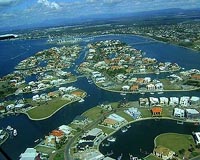| . |  |
. |
Brussels (AFP) Oct 26, 2009 The very real risk of failure on climate change is worrying EU leaders ahead of a summit starting Thursday, amid deep differences over how to help poor nations fight global warming. Financial aid from the 27 country EU and other rich, but major polluting countries, to help developing nations confront the challenge of global warming has become a key issue, six weeks before the world climate summit in Denmark. "We need to find a solution on financing, the internal burden-sharing," Sweden's European Affairs Minister Cecilia Malmstroem said Monday. "We need to do that very soon. I think our children cannot wait for us to get the figures right." Last week at preparations for talks among EU finance and environmental ministers, European officials took a tilt at the problem but matters are complicated by the economic crisis and budget concerns. The EU is divided into three camps: those who are willing to commit to funding led by Britain, a wait and see bloc headed by Germany, and eastern European nations with Poland at their head who want to help "based on their means", a diplomat said. The two-day summit in Brussels looks like being tough because the leaders may be forced to impose guidelines despite the differences, with the risk that it will further divide them. With their generosity curbed by economic concerns, it remains unclear what leaders like German Chancellor Angela Merkel will think, as Berlin prefers to wait for pledges from countries like China and the United States before acting. How much will Polish Prime Minister Donald Tusk accept after his finance minister ruled that "it's totally unacceptable that the poor countries of Europe should help the rich countries of Europe to help the poor countries in the rest of the world"? "We will not agree to a mechanism which would lead to such a completely unjust proposal," said Polish finance minister Jan Rostowski, whose nation is highly dependent on green-house gas laden coal to generate electricity. Poland, along with eight other central European countries, is also refusing to contribute funds based on the amount of carbon-dioxide emissions it produces, contrary to what the EU is asking of other major polluters. The European Commission -- the bloc's executive body -- estimates that poorer countries would need around 100 billion euros (149 billion dollars) annually from 2020 to fight global warming. The EU, it says, should pay two to 15 billion a year; a far cry from the 35 billion euros that environmental organisations believe it should stump up. A further five to seven billion euros is needed for start-up action in those countries from 2010 to 2012. "This is the most complicated issue, because it's all about trying to find money in a very tight budgetary period," one negotiator said. A draft document laying out the EU's common position on this key issue is at the moment full of blank spaces where figures should be, which does not augur well for the summit. Under those circumstances, the group of countries which would rather wait and see -- the biggest of the three blocs -- is well placed to win. "We are not quite on the final straight. For the moment, the EU is leading the way just ahead of the others. Now is not the time to come up with figures ahead of the others," the negotiator said. But Malmstroem urged the leaders to come up with the goods, with the December 7-18 Copenhagen international summit on climate change closing in. "We need to send a strong signal to the international negotiations," she said. Share This Article With Planet Earth
Related Links Climate Science News - Modeling, Mitigation Adaptation
 Rising seas 'threaten thousands of Australian homes'
Rising seas 'threaten thousands of Australian homes'Sydney (AFP) Oct 27, 2009 Australia may have to force people to evacuate coastal areas as rising sea levels threaten thousands of homes, an official report has warned. The National Sea Change Taskforce said urgent action was needed to protect Australia's coast from seas expected to rise more than 80 centimetres (31 inches) this century. The sweeping parliamentary report noted that 80 percent of Australians live ... read more |
|
| The content herein, unless otherwise known to be public domain, are Copyright 1995-2009 - SpaceDaily. AFP and UPI Wire Stories are copyright Agence France-Presse and United Press International. ESA Portal Reports are copyright European Space Agency. All NASA sourced material is public domain. Additional copyrights may apply in whole or part to other bona fide parties. Advertising does not imply endorsement,agreement or approval of any opinions, statements or information provided by SpaceDaily on any Web page published or hosted by SpaceDaily. Privacy Statement |